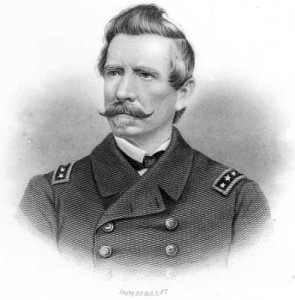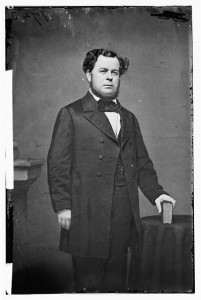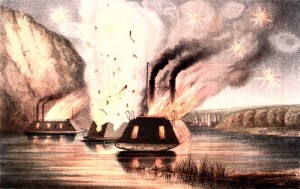“and the ruin of an entire people”
150 years ago today the Union army attacked the outnumbered Army of Northern Virginia along the Petersburg-Richmond front. The rebel army retreated and the rebel government had to evacuate its capital. And Raphael Semmes was ordered to blow up his rebel James River fleet and make his sailors soldiers. Later that day Admiral Semmes observed returning rebel prisoners cheering his fleet unaware that the Confederacy was crumbling to pieces. The rebel ironclads were actually blown up after midnight on April 3rd.
From Memoirs of Service Afloat, During the War Between the States (1869) (pages 808-812) by Raphael Semmes:
The final and successful assault of Grant was not long delayed. The lines in the vicinity of Petersburg having been weakened, by the necessity of withdrawing troops to defend Lee’s extreme right, resting now on a point called the Five Forks, Grant, on the morning of Sunday, the 2d of April, made a vigorous assault upon them, and broke them. Lee’s army was uncovered, and Richmond was no longer tenable! …
[new chapter]
As I was sitting down to dinner, about four o’clock, on the afternoon of the disastrous day mentioned in the last chapter, on board my flag-ship, the Virginia, one of the small steamers of my fleet came down from Richmond, having on board a special messenger from the Navy Department. Upon being introduced into my cabin, the messenger presented me with a sealed package. Up to this time, I was ignorant, of course, of what had occurred at Petersburg. I broke the seal and read as follows:—
Confederate States of America,
Executive Office, Richmond, Va., April 2, 1865.
Rear Admiral Raphael Semmes,
Commanding James River Squadron.
Sir:—General Lee advises the Government to withdraw from this city, and the officers will leave this evening, accordingly. I presume that General Lee has advised you of this, and of his movements, and made suggestions as to the disposition to be made of your squadron. He withdraws upon his lines toward Danville, this night; and unless otherwise directed by General Lee, upon you is devolved the duty of destroying your ships, this night, and with all the forces under your command, joining General Lee. Confer with him, if practicable, before destroying them. Let your people be rationed, as far as possible, for the march, and armed and equipped for duty in the field. Very respectfully, your obedient servant,
S. R. Mallory, Secretary of the Navy.
This was rather short notice. Richmond was to be evacuated during the night, during which I was to burn my ships, accoutre and provision my men, and join General Lee! But I had become used to emergencies, and was not dismayed. I signalled all my captains to come on board, and communicated to them the intelligence I had received, and concerted with them the programme of the night’s work. It was not possible to attempt anything before dark, without exciting the suspicions of the enemy, as we were no more than four or five miles from his lines; and I enjoined upon my commanders the necessity of keeping their secret, until the proper moment for action should arrive. The sun was shining brightly, the afternoon was calm, and nature was just beginning to put on her spring attire. The fields were green with early grass, the birds were beginning to twitter, and the ploughman had already broken up his fields for planting his corn. I looked abroad upon the landscape, and contrasted the peace and quiet of nature, so heedless of man’s woes, with the disruption of a great Government, and the ruin of an entire people which were at hand!
So unsuspicious were the Government subordinates, of what was going on, that the flag-of-truce boats were still plying between Richmond, and the enemy’s head-quarters, a few miles below us, on the river, carrying backward and forward exchanged prisoners. As those boats would pass us, coming up the river, filled to overflowing with our poor fellows just released from Yankee prisons, looking wan and hollow-eyed, the prisoners would break into the most enthusiastic cheering as they passed my flag. It seemed to welcome them home. They little dreamed, that it would be struck that night, forever, and the fleet blown into the air; that their own fetters had been knocked off in vain, and that they were to pass, henceforth, under the rule of the hated Yankee. I was sick at heart as I listened to those cheers, and reflected upon the morrow.
General Lee had failed to give me any notice of his disaster, or of what his intentions were. As mine was an entirely independent command, he, perhaps, rightly considered, that it was the duty of the Executive Government to do this. Still, in accordance with the expressed wishes of Mr. Mallory, I endeavored to communicate with him; sending an officer on shore to the signal station, at Drury’s Bluff, for the purpose. No response came, however, to our telegrams, and night having set in, I paid no further attention to the movements of the army. I plainly saw that it was a case of sauve qui peut, and that I must take care of myself. I was to make another Alabama-plunge into the sea, and try my luck. Accordingly, when night drew her friendly curtain between the enemy and myself, I got all my ships under way, and ran up to Drury’s Bluff. It was here I designed to blow up the iron-clads, throw their crews on board the wooden gunboats, and proceed in the latter to Manchester, opposite Richmond, on my way to join General Lee. Deeming secrecy of great importance to the army, in its attempted escape from its lines, my first intention was to sink my fleet quietly, instead of blowing it up, as the explosions would give the enemy notice of what was going on. The reader may judge of my surprise, when, in the course of an hour or two after dark, I saw the whole horizon, on the north side of the James, glowing with fires of burning quarters, materiel, &c., lighted by our own troops, as they successively left their intrenchments! Concealment on my part was no longer necessary or indeed practicable.
I now changed my determination and decided upon burning my fleet. My officers and men worked like beavers. There were a thousand things to be done. The sailor was leaving the homestead which he had inhabited for several months. Arms had to be served out, provisions gotten up out of the hold, and broken into such packages, as the sailors could carry. Hammocks had to be unlashed, and the blankets taken out, and rolled up as compactly as possible. Haversacks and canteens had to be improvised. These various operations occupied us until a late hour. It was between two and three o’clock in the morning, before the crews of the iron-clads were all safely embarked on board the wooden gunboats, and the iron-clads were well on fire. My little squadron of wooden boats now moved off up the river, by the glare of the burning iron-clads. They had not proceeded far, before an explosion, like the shock of an earthquake, took place, and the air was filled with missiles. It was the blowing up of the Virginia, my late flag-ship. The spectacle was grand beyond description. Her shell-rooms had been full of loaded shells. The explosion of the magazine threw all these shells, with their fuses lighted, into the air. The fuses were of different lengths, and as the shells exploded by twos and threes, and by the dozen, the pyrotechnic effect was very fine. The explosion shook the houses in Richmond, and must have waked the echoes of the night for forty miles around.



